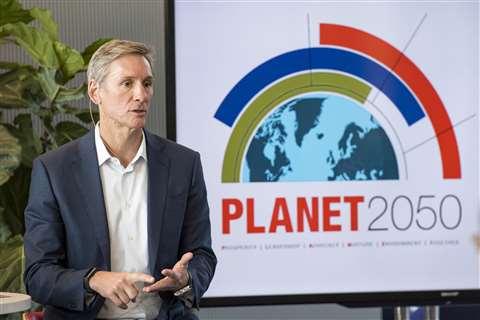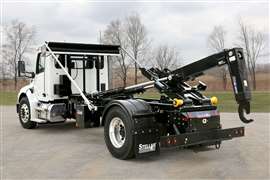Cummins accepted into two climate advocacy groups
22 October 2021
 Cummins chairman and CEO, Tom Linebarger
Cummins chairman and CEO, Tom Linebarger
Cummins has revealed that it has been accepted into two groups advocating for climate action ahead of the COP26 summit. The summit will open in Glasgow, Scotland on 31 October.
The Business Ambition for 1.5oC campaign encourages companies to set emissions reduction goals for greenhouse gases. These are based on targets aligned with the 2015 Paris Climate Accords.
By extension, Cummins has also been accepted into the United Nations’ Race to Zero, a global campaign which looks to get support from businesses, investors, cities and regions to help with climate action.
Both groups maintain that acting now can prevent future environmental threats, create jobs and unlock sustainable growth.
Cummins worked with the Science Based Targets Initiative to develop the company’s Planet 2050 environmental strategy, released in 2019. The strategy details goals to be achieved by 2030 using targets from the Paris Climate Accords. It further outlines a path to reach net zero emissions by 2050.
Cummins’ chairman and CEO, Tom Linebarger, said the world’s climate challenges threaten the company’s ability to deliver on its mission of making people’s lives better by powering a more prosperous world.
“Climate change is the existential crisis of our time and the biggest threat to our mission as an organization,” said Linebarger. “So, we want to dedicate our innovation, our talent, our resources, and our investments to reduce our impact on the climate. Of course, we have a lot of other challenges to address at the same time to fulfill the needs of our stakeholders, but if we don’t address climate change, there will be nothing else to do.”
Cummins is advocating for climate action through its participation with a number of groups, including the CEO Climate Dialogue, the Business Roundtable, the International Council on Clean Transportation and the global Hydrogen Council.
Cummins’ Linebarger serves as co-chair of the Hydrogen Council.
The engine manufacturer has been working to reduce the environmental impact of core products, including diesel and natural has engines. Improvements have helped cut emissions of two key contributors to smog from diesel engines, particulate matter and NOx, by more than 95% since the 1990s.
The company has also be active in bringing to market low- and no-carbon power technologies, including battery and fuel cell electric.
POWER SOURCING GUIDE
The trusted reference and buyer’s guide for 83 years
The original “desktop search engine,” guiding nearly 10,000 users in more than 90 countries it is the primary reference for specifications and details on all the components that go into engine systems.
Visit Now
STAY CONNECTED




Receive the information you need when you need it through our world-leading magazines, newsletters and daily briefings.
CONNECT WITH THE TEAM













